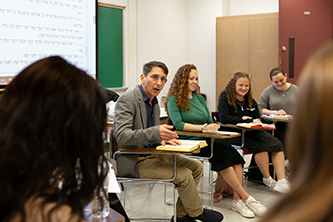Biblical Hebrew Class Unveils the Power of Ancient Texts
November 1, 2022
Associate Professor David Brodsky offers rare look into the nuances and beauty of Judaic life, both ancient and present, in popular Biblical Hebrew course.
.jpeg)

One of its major goals of David Brodsky’s Biblical Hebrew course is to get the students to see that there have always been a variety of approaches, both traditional and scholarly, to the Bible.
When you first sit down in one of David Brodsky’s Biblical Hebrew classes (HEBR 4041— Hebrew Bible: The Historical Books), you might feel like you stepped back in time. And if you don’t read Hebrew, you might feel a little lost … at first.
But, after a while you begin to understand that the lessons learned from the texts—some that date back to 550 BCE—could not be more relevant or thought provoking. You also realize that the students are being offered a rare gift that few other American colleges offer.
Brodsky, an associate professor who is also the chair of the Judaic Studies Department, says the course has been around for years but was rebooted again for the Spring 2020 semester. Apart from the obvious goal of developing students’ Biblical Hebrew language skills and their knowledge of the Hebrew Bible, one of its major goals is to get the students to see that there have always been a variety of approaches, both traditional and scholarly, to the Bible.
“I want students to see that even within traditional/religious approaches and among scholarly approaches, there is not and has never been one single way to approach the text,” says Brodsky. “Some of those are traditional and/or religious, and some are modern and/or academic. What I want students to see from the comparison of all these approaches is that we share many of the same questions about the text, and then each approach offers a different lens that leads to a different perspective and therefore answer. Taken together, these various perspectives offer us a richer and more nuanced understanding of the text and its reception.”
The course—which counts toward the Judaic studies major and the foreign language requirement—sees students with varying knowledge of Hebrew read through the Book of Samuel, considered one of the most engaging sagas in the Hebrew Bible. Students cover three chapters of the Bible each class, reading selections of it together in Hebrew for the first 35 minutes, and then stepping back and discussing the chapters as a whole in English for the second 35 minutes.
One class in October saw students sitting in the round—another distinct class characteristic—engaging in a lively debate on the contradictions sprinkled through various texts.
“While you will see different answers, they are asking the same questions,” Brodsky says. “These contradictions gave birth to the richness and complexity that is Judaism. The answer to Judaism is really in the questions themselves.”
Brodsky also uses examples from the Midrashic hermeneutic—one about how many times unleavened bread should be eaten during the seven-day Passover festival. While some biblical passages said seven, others said six, and a midrash (a traditional form of Jewish commentary) interpreted the contradiction to imply just one day is required. Rather than shying away from these contradictions, for midrash, they are intentional and key to unlocking the deeper meanings of the text. Brodsky showed the class that ancient and modern, traditional, and academic scholars all notice these same contradictions. What they do with them reveals their respective approaches. For Brodsky, this is an important aspect not only to the class but to Jewish life.
What also makes the course special is the number of students enrolled. According to Brodsky, outside of Israel where these types of classes are more commonplace, you might find just a handful of students studying Biblical Hebrew in other American colleges and universities. At Brooklyn College, there are 18 students enrolled in the class this semester—a fact also highlights the rich and diverse student body at the college and the surrounding borough.
“What I really enjoy about the Hebrew Bible is that it is a complex text without a simple interpretation,” says student Norma Sutton. “The Book of Samuel, which we are studying for class this semester, is a psychologically insightful, politically nuanced text that is also a riveting saga about love, war, conflict, and the struggle for peace and prosperity. I love everything from doing close readings of the text that can only be accomplished through a careful honing of linguistic and philological skills to the broad scope of the narrative.”
Sutton is a junior majoring in Judaic studies. She took the course because of her love of languages, particularly Hebrew and specifically the Book of Samuel.
“There are so many nuances to the Hebrew language, and really learning the various binyanim helps you understand more,” Sutton added. “I love analyzing the biblical texts, finding contradictions or grammatical problems, asking the questions and really diving in to finding the answers, the same way Rabbis and academics have done for years.”
Sutton added that studying with her classmates in the round was also enjoyable. And if she becomes a teacher, that is a style of teaching she would like to utilize.
“As a proud observant Jew, with a full family of my own at home, it’s beautiful to have the knowledge of ancient Hebrew, to be able to find the origins of various laws, customs, and traditions in the biblical text,” Sutton says. “This course is also helpful for my future goals. It is strengthening my skills with the Hebrew language, it’s learning Torah, analyzing various interpretations and perspectives, and it is taught in a fun and engaging style. As the semester continues, I realize just how much I love the Hebrew language.”
To learn more about Judaic studies at Brooklyn College, go here: https://www.brooklyn.cuny.edu/web/academics/schools/socialsciences/departments/judaic.php






